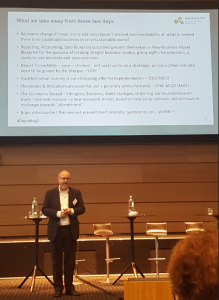
How to be a sustainable business in an unsustainable world
Like many I suspect, we sometimes come away from conferences wondering whether we’ve actually learnt too much that is radically different. But not with Reporting 3.0’s annual conference which was again held this year at KPMG’s offices in Amsterdam. It was genuinely thought-leading, setting out the context and need for a different type of disclosure from business – one which will support and drive the shift to a green, open and inclusive economy – as well as provide inspiration and tools for implementation, including their eagerly anticipated new Transformation Journey Programme.
Here are our 5 key takeaways:
There is no sustainable business in an unsustainable world

If the economic system we operated in were sustainable, would we need to pursue sustainability? Logic suggests not. We do it precisely because the system is unsustainable – it isn’t regenerative or redistributive, there aren’t enough resources to go around and what we do have isn’t valued or shared equally. This means that if we are to make genuine progress, we must take a much broader perspective. For business, this means putting corporate sustainability efforts in the context of regional, industry, national and global issues.
This will lead to meaningful changes in the way we do things and the scaling up of solutions that address the design of the economic system. For example, moving from linear take-make-dispose business models and consumption patterns to circular models which aim to retain resources in the system at their highest value. In short, we must progress from corporate sustainability that focuses on incremental changes at the company-level only.
From mono-capitalism to multi-capitalism
Companies create value in many different ways that go far beyond the stocks and flows of financial capital. Whether improving people’s lives through products and services (social capital) or through hiring and employee development practices (human capital) to give a couple of examples. A business that understands how it creates value in broader than just financial terms (and the resources it needs to do that) is able to make better decisions on how it can optimise that value. I really liked the reference to this as pre-financial rather than non-financial information, repositioning it as essential for decision-making and long-term value creation. With Richard Howitt, CEO of the International Integrated Reporting Council (IIRC) keynoting at the conference, it was also encouraging to hear the announcement of a collaboration and white paper between Reporting 3.0 and IIRC to help further embed integrated multi-capital thinking more widely in business.

Accountants will save the world
This may be exaggerating it a touch, but surely we need better accounting mechanisms, that account for externalities – the effects of a company’s products, services and operations on third parties, positive and negative? A better understanding of the true costs and value of doing business would likely lead to significant changes in how we make, consume and dispose of products.
Although there is currently no accepted methodology or framework to account for externalities, some companies are taking significant steps. It was great to hear first-hand from financial services firm ABN Amro which has used an Integrated Profit & Loss (IP&L) approach to understand how different parts of its business such as mortgage lending create long-term value for society and different stakeholders and more recently valuing its investment in its workforce. Although not yet officially part of its balance sheet, it is overlaid onto the financial accounts to aid decision-making internally.
Linked to this, we heard that an estimated 52% of company market value is based on factors and ‘intangible’ assets that rarely appear on the balance sheet – IP, human capital, brand value etc. For companies to understand their true market value better, we must first understand what drives the value of these assets. And the starting point for this is where and how does the organisation create or add value.
Launched at the conference, Reporting 3.0’s new accounting blueprint – to accompany and interact with its reporting, data and new business models blueprints – offers a framework which factors in externalities via a multi-layered income statement and balance sheet. It’s well worth a look.
Context is everything
We need a much better understanding of and consistency around underlying ecological, social and economic thresholds – in other words, the carrying capacities of the resources (or capitals) we need for society and business to survive and thrive. That way companies can set meaningful targets and organisation-specific standards of performance based on allocations or shares that are fair, just and proportionate. Think science-based carbon targets for everything else. The multi-stakeholder Global Thresholds & Allocations Council (GTAC) has been established to achieve much greater knowledge and consistency in this area.
From competitive to collaborative advantage
There is a growing realisation that if we are to alter the course, we’re on and live successfully within our means, then we need a radical change in mindset. Daniel Wahl, the author of Designing Regenerative Cultures and keynote at the conference, discussed a shift from competitive to collaborative advantage, and it resonated.
Collaboration is a real buzz-word in this sector but what does it mean and how are companies using it? Real collaboration starts with the ability to relate to and engage with diverse stakeholders and understand many different perspectives – it requires openness, honesty, empathy and many other softer skills. It needs to transcend traditional hierarchies, structures and sectors to ultimately pursue transformative solutions which address the complexity and interconnectedness of issues such as climate change, resource scarcity and social inequality. How prepared for this is your business?
Final thought
We left in no doubt about the scale of the challenges that lie ahead but, armed with this knowledge and these tools, excited about the opportunities that this kind of transformational change offers and the ability we have to support our clients on this collective journey.
